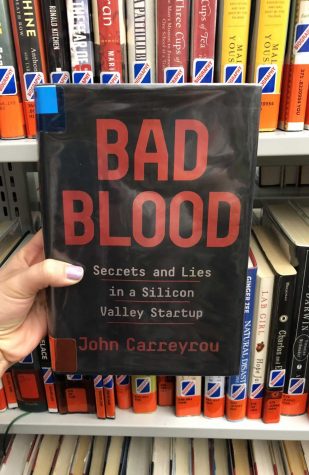‘Bad Blood: Secrets and Lies in a Silicon Valley Startup’ Book Review
September 11, 2019

In pursuit of becoming the next Steve Jobs, Elizabeth Holmes, a Stanford drop out, created a company in 2003, called Theranos. The company’s mission? To be able to take blood samples by only using a drop of blood from a finger. Sounds like a great idea right? That’s what investors thought until the company failed to produce an actual working product.
John Carreyrou, a journalist from the Wall Street Journal, wrote “Bad Blood: Secrets and Lies in the Silicon Valley Startup,” following his series of investigative reports on the company in October of 2015. Carreyrou’s reporting on the company and its secret and shady practices fascinated me from the moment I started reading it. Having watched bits of the ABC documentary series “The Drop Out,” and HBO’s “The Inventor: Out for Blood in Silicon Valley,” I was familiar with Holmes and her “unicorn” start-up company and its downfall.
The book goes deep into the former employees, board members, inter-company romantic relationships, all for a product, (first called the Edison, then later the Mini-Lab,) which was said to be able to test blood samples from a drop of blood. The device constantly had inconsistencies, causing those who used it to believe they had a serious health problem, when they in fact did not.
Following an article in Fortune, Holmes shot to fame in the business world. At her peak, Holmes was worth $4.5 billion in 2014, according to Esquire.
The most appalling thing to me, was how far Holmes and Theranos were able to get in terms of funding and popularity. The company was so convincing and popular, that at one point even Vice President Joe Biden visited the offices of Theranos in 2015.
The blood testing machines were tested in Walgreens stores in Arizona, with patients later suing the company for false results.
To see the fall of a company that was dealing with people’s health, and the negligence to fix problems even after its debut in stores for public use showed their true intentions: money. It wasn’t about saving lives but about continuing the façade.
While I am not the most knowledgeable on the jargon used in the medical field, the author made a clear effort to simplify what he was saying so readers could understand the basics.
Holmes was indicted in June 2018 for committing fraud against investors, patients and doctors. She will stand trial in Aug. of 2020.
This book was a fascinating deep dive into a company, that had me absolutely hooked.
5/5 Stars.

















